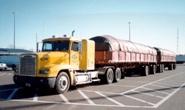Logistics

January 24, 2018
Truckers Seek Support for New Infrastructure Fuel Tax
Written by Tim Triplett
The trucking industry’s leading trade group is calling on policymakers to back a new 20-cent tax on all transportation fuels, including diesel, gasoline and natural gas, to fund repairs to the nation’s deteriorating roads and bridges.
The American Trucking Associations (ATA) is seeking support for its Build America Fund, which would be funded by a federal fuel usage fee built into the price of wholesale transportation fuels collected at the terminal rack, phased in at a nickel per year over four years. The fee would be indexed to both inflation and improvements in fuel efficiency, with a 5 percent annual cap. The current Highway Trust Fund, paid for by a federal gas tax collected at the pump that has not been increased since 1993, is projected to go broke by 2021 without an infusion of additional tax dollars.
“Tax reform has reignited the American economy, and it is paramount that this new economic growth is supported by a strong national infrastructure. A 21st century transportation network cannot be sustained with financial tricks and finance schemes—it requires real and substantial investment,” said ATA President and CEO Chris Spear. “The Build America Fund is the most efficient, and conservative, way to generate infrastructure investment and adheres to the bedrock principal that users only pay for what they use.”
ATA estimates the Build America Fund would generate $340 billion in new revenue over the first 10 years. Although trucks account for 14 percent of vehicle miles traveled on the nation’s roads, the trucking industry currently covers approximately 45 percent of the Highway Trust Fund through the commercial truck diesel and gas tax and other trucking-specific excise taxes.
“The trucking industry is putting our money where our foot is. Trucking already pays half the nation’s highway funding tab, and we are ready to pay more,” said Spear. “Through the Build America Fund, the trucking industry would invest upwards of an additional $112 billion into our nation’s roads and bridges over the next decade. Solving a challenge of this size requires big and bold solutions, and we call on Washington to step up with us.”
The average passenger vehicle would pay approximately $100 over the course of a year into the Build America Fund, an investment for which motorists will see a substantially larger return in saved time, fuel and repair expenses, the association asserts. “The cost of doing nothing is far greater,” said Spear. “The typical motorist is losing $1,500 each year in wasted gas and vehicle repairs because of our crumbling infrastructure, which is far greater than what they would pay into the Build America Fund.”
A fuel tax is a more efficient revenue-generator than highway tolls, ATA noted, as 12 percent of tolling revenue is wasted to administrative, collection and enforcement costs. In comparison, 99 percent of revenue collected through a fuel user fee would be allocated to its intended purpose of maintaining infrastructure.
The majority of Americans (57 percent) in a June 2017 survey agreed that a 20-cent-per-gallon federal fuel user fee is the preferable way to fund the nation’s needed four trillion dollars of road, bridge and highway improvements. Comparatively, only 23 percent prefer placing new tolls on interstate highways, and 8 percent favor a per mile fee charged to motorists.
“To build America, we must invest in America,” said Spear. “It is why President Trump has repeatedly said he wants to launch a serious infrastructure investment plan, and we call on Washington to join us in doing just that.”
The timing of ATA’s proposal is perhaps less than ideal. It’s likely to see tepid support from shippers, such as those in the steel industry, who are already facing rising costs for trucking services in 2018. The market is waiting to see how much recent regulatory changes requiring electronic logs and limiting drivers’ hours behind will affect freight rates.






